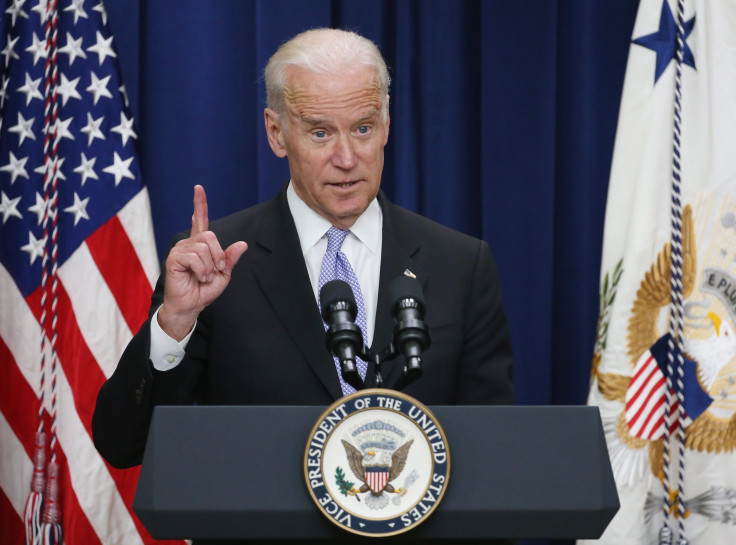Biden Visits Iraq For Talks With Officials, Show Of Support

U.S. Vice President Joe Biden met Iraqi Prime Minister Haider al-Abadi in an unannounced visit to Baghdad on Thursday to show support for the government as it builds on wins against Islamic State amid the distractions of a political crisis.
It is the first visit for Biden, the White House's point person on Iraq, since U.S. forces withdrew in 2011 following a nine-year occupation. He is the third and highest-level U.S. official to visit Iraq this month.
Islamic State, also known as ISIL, seized large portions of Iraq and neighboring Syria in 2014. Iraqi forces have won back some territory, such as the western city of Ramadi, but often after long battles that have left the areas destroyed.
Biden's trip, several months in planning, is a sign of the progress the White House believes Iraqi forces have made in beating back the militants over the past year.
The vice president has close relationships with Iraqi leaders and speaks with them about every 10 days, a senior administration official said.
Still, "there's no substitute for being able to sit down face-to-face," a U.S. official said.
Biden's first meeting was with Abadi to discuss "developments in the political, security and economic situations," state television said. The White House has not released details of his schedule in Iraq for security reasons.
The trip serves to counter a "misperception in the region" that Iran has undue influence in the nation, a senior administration official said.
But it comes at a turbulent time in Iraqi politics. Abadi has faced resistance to a government overhaul aimed at tackling corruption. He won lawmakers' approval to replace a handful of ministers on Tuesday after weeks of delays and disruptions from dissenting MPs.
The political battle has also sparked populist protests that have forced the government to bring back troops from the front lines to secure the capital.
U.S. officials have expressed concern that the unrest could distract from the war against Islamic State. Secretary of State John Kerry and Defense Secretary Ash Carter visited Baghdad earlier this month to show their support.
"It's been a pretty all-consuming political affair," a senior U.S. official told reporters, noting recent signs of a "calmer trajectory" in the drama.
President Barack Obama has said he has seen "momentum" in the efforts of a U.S.-led coalition fighting Islamic State, and recently authorized more U.S. forces to go to Iraq and Syria to help train and assist local fighters.
Their goal is to help Iraqi and Kurdish forces retake Mosul by the end of the year.
The United States has redeployed several thousand troops to Iraq to help with the Islamic State battle.
Biden wants to discuss plans for retaking Mosul during his meetings, an official said, hoping some progress can be made before the extreme summer heat.
The White House is concerned that not enough is being spent to rebuild parts of Iraq devastated by the fight, a deficit made worse by low oil prices, Iraq's main revenue source.
The United Nations is urgently seeking $400 million from Washington and its allies for reconstruction, while Obama asked Gulf Arab leaders to assist during a visit to Riyadh last week.
He also discussed the issue with European leaders in London and Hanover, Germany, and told reporters Iraqi reconstruction would be a topic for the G7 meeting in Japan next month and for NATO.
© Copyright Thomson Reuters 2024. All rights reserved.











